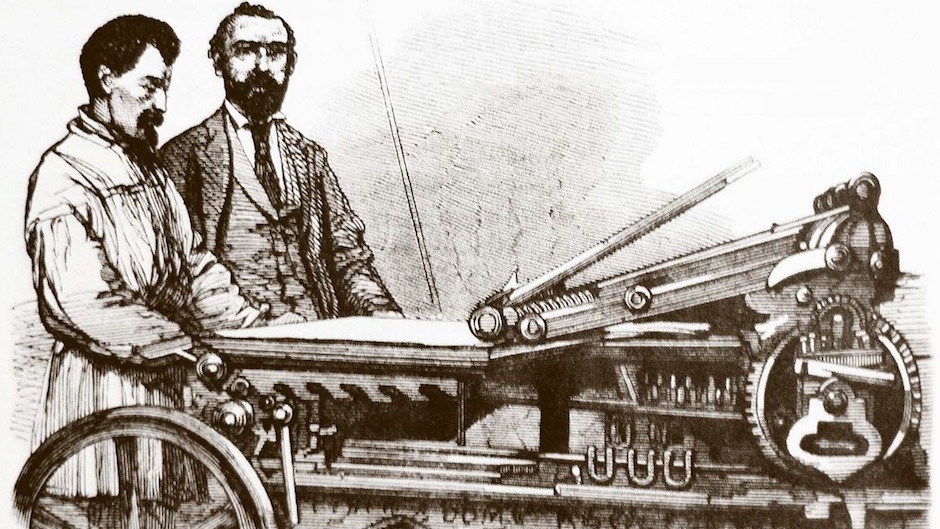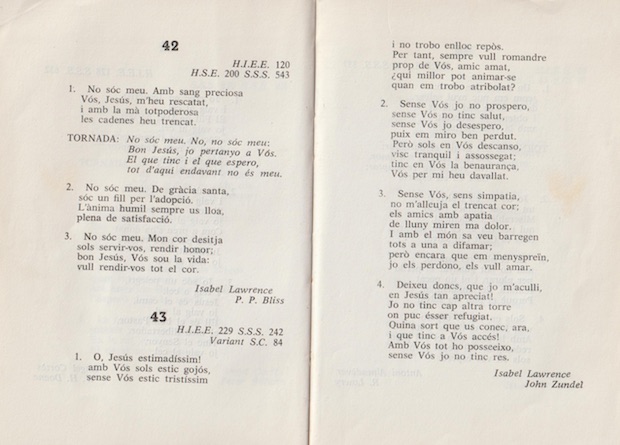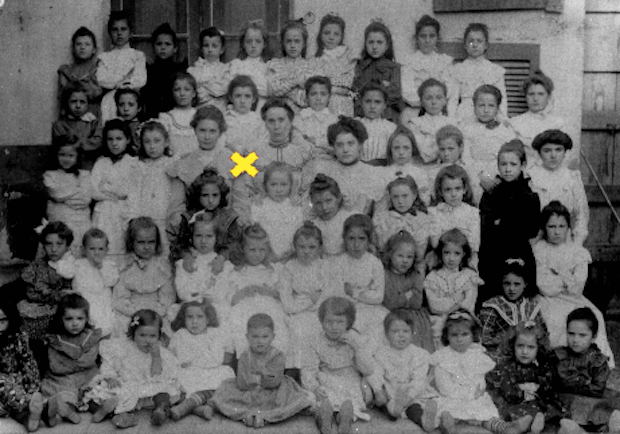Among the cultural legacy that the Welsh missionary George Lawrence left to the evangelicals in Catalonia is a collection of hymns in the local language that have been sung for generations.
 George Lawrence (right), working in his own printing shop in Barcelona. / Courtesy of the owner.
George Lawrence (right), working in his own printing shop in Barcelona. / Courtesy of the owner.
This year 2021, marks the 125th anniversary of the publication of Càntichs Evangèlichs (Evangelical hymns), one of the first evangelical hymnals in Catalan language edited and prepared by George Lawrence, which was published posthumously in 1896.
The Welsh missionary, who died in 1894, was the founder of schools for children and adults in the town of Gràcia (which now has become a district of Barcelona). He also started a 'School for the Poor' in the town of Caldes de Montbui and planted an evangelical church.
Lawrence event promoted the opening of the Good Samaritan hospital in Barcelona, considered the forerunner of today's Nou Hospital Evangèlic (New Evangelical Hospital).
“When you look at his social influence, people think of his charitable, medical and educational work”, says Christina Evangelina Lawrence, the Welsh missionary's great-granddaughter, speaking to Spanish news website Protestante Digital.
“But he was pioneering for the society of the time, and especially for the movement of the Assemblies of Brethren, among which he began his missionary work”, she adds.

In addition to his work on the ground in favour of the most vulnerable and those who had fewer opportunities in the second half of the 19th century, Lawrence also worked to protect and guarantee religious freedom in the country as Alfonso XII accessed the Spanish throne. In this time, Lawrence was in close contact with the British Prime Minister, Lord Derby, as historical documentation of the Assemblies of the Brethren shows.
The missionary published The Gospel in Spain (1872) and printed copies of the Bible, which, in many cases, were the first contact with the Scriptures for many of the 10,500 pupils who attended his schools at some point - a witness that would impact the children's families as well.
The first edition of Càntichs Evangèlichs contained 18 hymns popular in the Catalan evangelical churches of the time, although it was later expanded and up to 22 of its pieces also appeared in the hymnal that Armengol Felip published in 1924, according to Joaquim Campistron, who has followed Lawrence's story and organised a route in Caldes de Montbui, the village where the missionary died.
“Elizabeth Lawrence appears in Armengol Felip hymnal. It can be considered that she was the author of many of the hymns, coinciding with the oral information passed down from parents to children that has been passed on to me. And we know that Elisabeth liked to write”, underlines Campistron.

Elizabeth's leading role in the publication of Càntichs Evangèlichs is not an isolated case in the way Lawrence viewed women's ministry.
“The Protestant historian Tim Grass, in his book Generations: British Brethren Mission in Spain, 1834-1990, quoted George Lawrence in one of his letters to 'Echoes of Service', the Brethren missionary organisation, in 1875, saying: 'The value of English women workers is not in keeping the school, but in helping the native converts to progress in their faith; supervising the teachers; acquainting themselves with the parents, and, in due time, introducing them to the Word of Life”, says the missionary's great-granddaughter.
Christina explains that “his daughters were principals of the schools, not simply teachers. After his death in 1894, they continued in these roles of authority, founding new schools in Catalonia. This contrasted with the usual missionary reports, which mostly contained letters written by men”.
His daughter Elizabeth “translated gospel hymns from English into Spanish and Catalan, mostly from the hymn book Sacred Songs and Solos, which have been used by the Assemblies of Brethren, but of course also by many evangelical denominations”, underlines Christina.
In 1880, Lawrence's eldest daughter published the book The Dawn in Spain, in which she reviewed the missionary work carried out in the previous years.
One passage in the text reflects the importance of hymns for the Lawrence family: “On an outing with the students, he was asked: 'Don Jorge [George in Spanish], shall we sing as we walk?' To which he replied: 'Sing! Because if you don't, even the stones will cry out'”.

Las opiniones vertidas por nuestros colaboradores se realizan a nivel personal, pudiendo coincidir o no con la postura de la dirección de Protestante Digital.
Si quieres comentar o